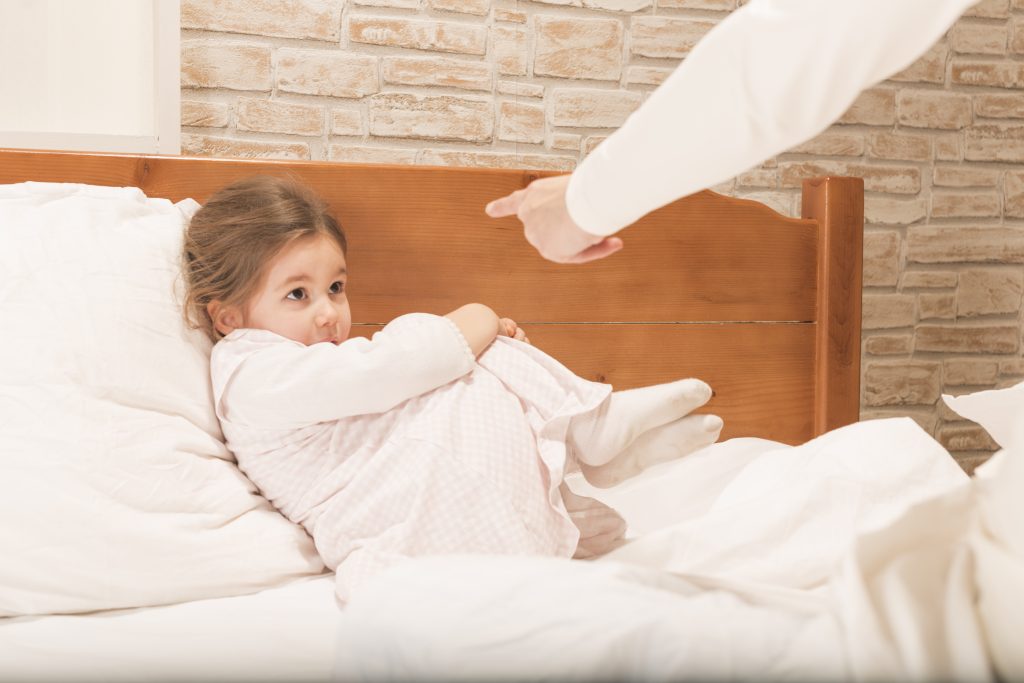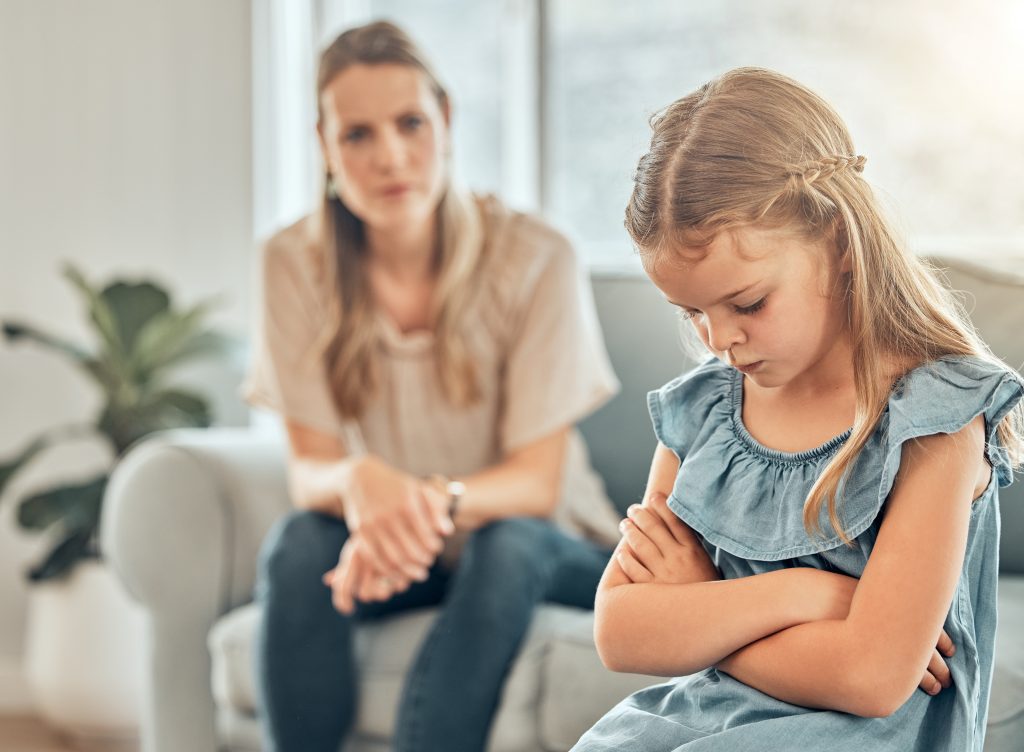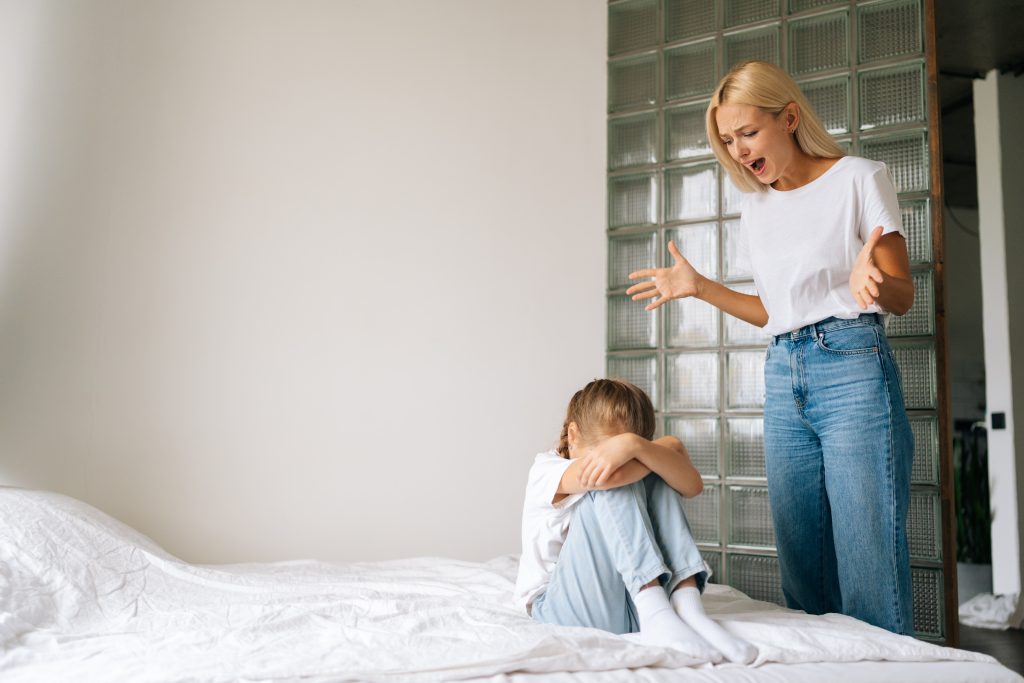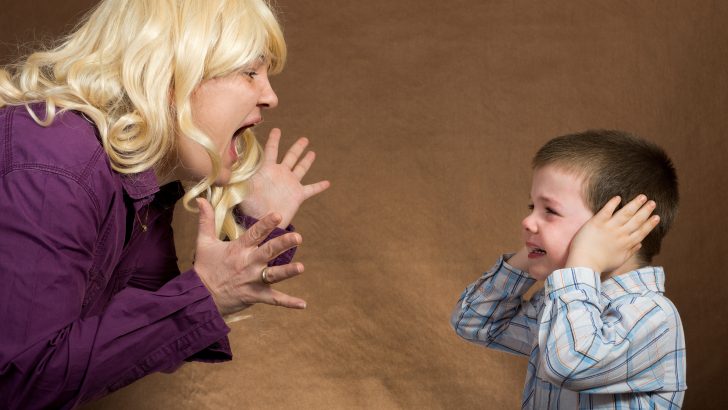Before you blame yourself or feel guilty, know that it happens to the best of us.
In fact, even the calmest, gentlest moms yell at their kids.
Of course, we’re not particularly proud of it.
In fact, as soon as we raise our voices, we regret it.
It takes us back to our childhood and the traumas we experienced because of our own parents.
Moms usually yell at their children because their brains recognize certain behaviors or cries from the child as toxic stress.
Each of us can handle small doses of stress, especially if it’s not cumulative.
But any prolonged exposure to stress is recognized by the brain as a danger, and screaming is the brain’s way of fighting back.
I’m sure that as a mother, there are countless times when you feel perfectly fine, but in a flash, everything changes.
You feel overwhelmed, anxious and edgy.
In short, you have a huge explosion of anger, after which you feel terrible.
You don’t recognize yourself!
The worst is often what follows, namely great feelings of shame and guilt, as I’ve already mentioned.

No one wants to be the screaming mother whose cries terrify the children.
So those emotions that arise after screaming are perfectly normal.
Finally, screaming is also a sign that the situation you’re currently facing has become too difficult for your rational brain.
An emotion has taken over, and an unpleasant one at that, and our brain is still doing everything it can to protect us.
It does this by trying to get rid of the unpleasant sensations as quickly as possible.
The tendency to avoid discomfort is also one of our basic psychological needs.
In fact, human beings find it very difficult to isolate themselves to confront these unpleasant, toxic emotions.
So the easiest and quickest way to get rid of these negative conditions is to find something outside ourselves.
We look for the origin of these emotions.
We need a culprit outside ourselves!
Of course, every mother has her own triggers.
For one mom, it’s going to be the high-pitched cries of children fighting over a toy.
For another, it’s the fact that her child asks her the same question a hundred times in a row.
So what one mother allows her child is a source of extreme stress for another.
This is because the triggers are already within us, they’re not something external to us, and they’re certainly not something universal.
In fact, they depend on all our past life experience and emotional memory.
It always depends on us and what we already have inside.
So what do you do once you’ve yelled at your kids?
What’s the healthiest way to handle the situation?
The goal is to show your children that they’re safe with you, and to protect you from your triggers in the future!
1. Accept what you’ve done and take responsibility for your actions

Above all, don’t tell your child that he’s exaggerating and that you ‘just’ raised your voice a little.
For example, avoid the following phrases:
- I’m sorry, but your behavior is unbearable.
- It’s not my fault, you’ve gone too far.
- You’re driving me crazy, you need to listen to me better!
Take responsibility for your screams!
Understand that your child was only a trigger, but not the cause of your anger.
After all, shouting is a consequence of your inability to control your own emotions.
When we are powerless to control ourselves and our emotions, we seek to control others and their behavior.
To take responsibility for your behavior, here’s what you can say to your child:
- I’m sorry I lost my temper.
- It’s not your fault!
- I promise I’ll make an effort to stop yelling at you.
- Don’t ever let anyone yell at you!
2. Show your child that his fear is legitimate

When you yell at your child, you feel guilt and shame.
But do you know how your child feels?
Scared!
So you realize that your child feels he can’t trust you.
He doesn’t feel safe with you!
And that saddens you.
To deal with this situation, you need to communicate openly.
Here are some phrases you can use:
- I scared you, didn’t I?
- How did it make you feel?
- I realize you were scared.
- I know, it’s not pleasant.
3. Create a secure bond with your child

You can bond over an activity you both enjoy.
There’s nothing wrong with a complete change of environment!
For example, if you’ve been yelling at your child in the bedroom, play cards in the living room.
If you’ve yelled at your child in the garden, offer to bake a cake in the kitchen.
In all cases, give your child at least twenty minutes of undivided attention.
If you then observe the child more closely, you’ll notice when the repair takes place.
Little by little, your child relaxes and becomes himself again.
You’ll notice that he’s happier.
After the repair and when everything’s finished, don’t feel guilty.
Screaming in itself leaves no trauma.
Trauma takes root when the child has to deal with the aftermath alone.
That is, if you don’t take responsibility and try to rebuild a bond with your child.
Trauma occurs when we fail to communicate our feelings and when we blame the child for our screams.
What’s more, it’s important to understand that it’s not the child’s behavior that makes you angry.
It’s your interpretation of the child’s behavior, based on your own childhood experiences.
Once you become aware of the thoughts that precede anger and your loss of control over our own behavior, you can replace these thoughts with something calming.
So, instead of an alarm signal, you’ll get an ode to relaxation.
Conclusion

When we lose control of our own behavior, we automatically want to control the child’s behavior.
But we can’t!
That’s when anger and frustration arise, leaving us feeling powerless.
And that helplessness makes us scream!
But screaming is inevitable.
We can scream less often, but never raising our voice to those we love most seems like a mission impossible.
In fact, parenthood is too intense and demanding for us to ever lose our heads and always remain calm and composed.

